An Overview: Native Title Act 1993 and the Torrens System in Australia
VerifiedAdded on 2022/09/18
|10
|2155
|20
Report
AI Summary
This report examines the Native Title Act 1993 and the Torrens System in Australia. It begins by defining the Native Title Act, outlining past, future, and intermediate acts influencing native title claims, and detailing how the Act affects native title rights and compensation. The report then explains the Torrens system of land title, including its history, registration process, and the concept of indefeasibility. It explores exceptions to indefeasibility, such as fraud, in personam claims, paramount interests, and the registrar's power to rectify the register. Finally, it presents a case study involving a dispute between Mr. Green and a bank, applying the rules of indefeasibility to determine priority of title. The report concludes that Mr. Green would likely have priority over the bank. References to relevant case law and legislation are included.
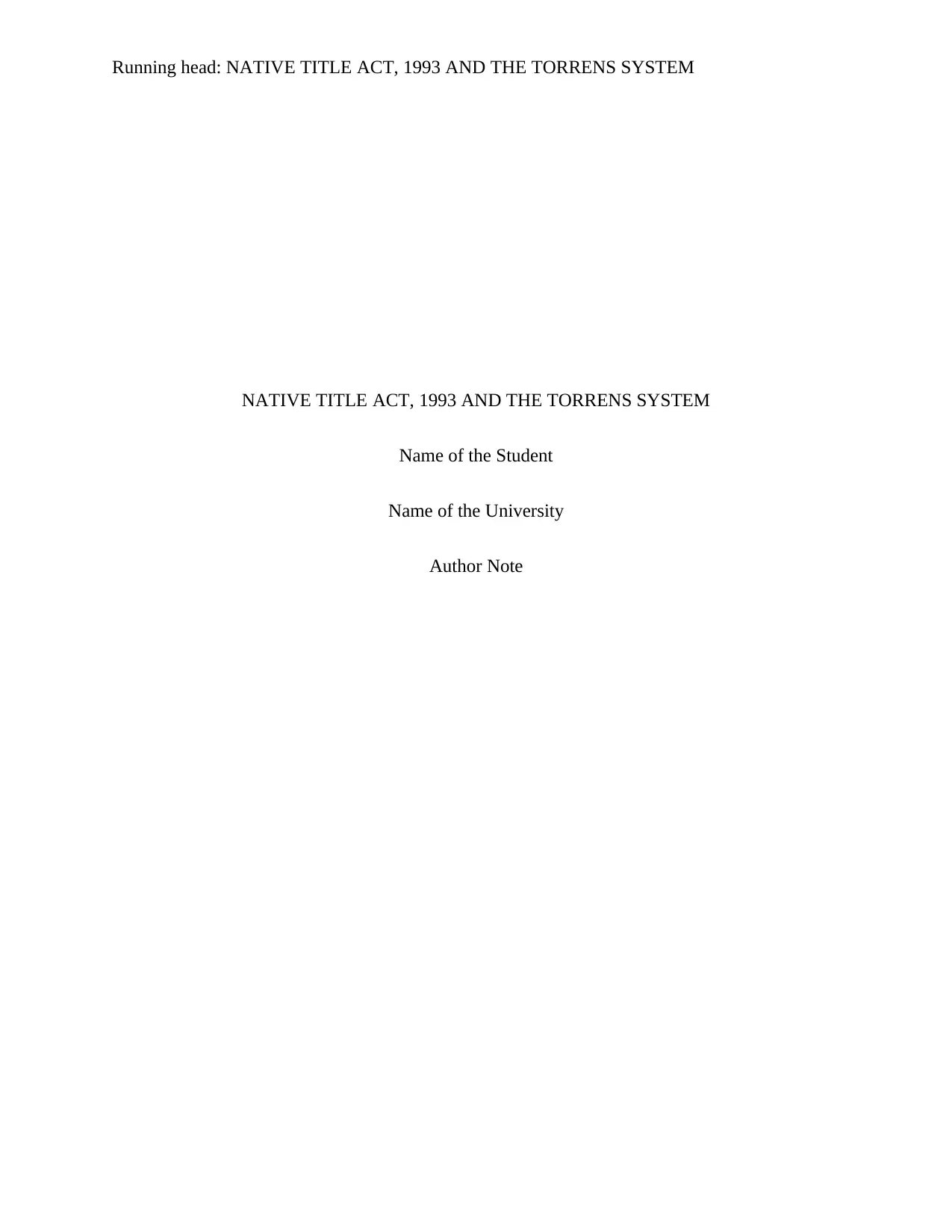
Running head: NATIVE TITLE ACT, 1993 AND THE TORRENS SYSTEM
NATIVE TITLE ACT, 1993 AND THE TORRENS SYSTEM
Name of the Student
Name of the University
Author Note
NATIVE TITLE ACT, 1993 AND THE TORRENS SYSTEM
Name of the Student
Name of the University
Author Note
Paraphrase This Document
Need a fresh take? Get an instant paraphrase of this document with our AI Paraphraser
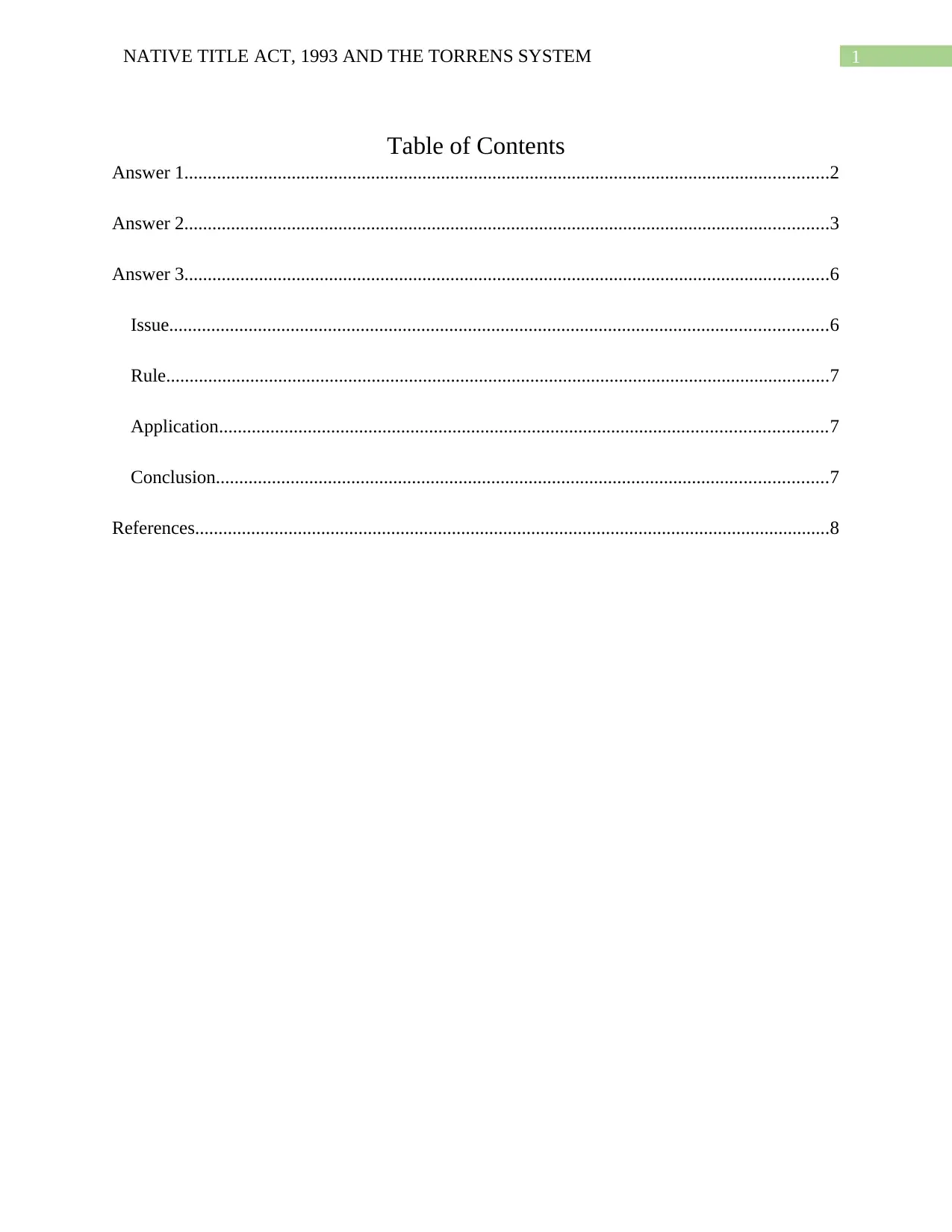
1NATIVE TITLE ACT, 1993 AND THE TORRENS SYSTEM
Table of Contents
Answer 1..........................................................................................................................................2
Answer 2..........................................................................................................................................3
Answer 3..........................................................................................................................................6
Issue.............................................................................................................................................6
Rule..............................................................................................................................................7
Application..................................................................................................................................7
Conclusion...................................................................................................................................7
References........................................................................................................................................8
Table of Contents
Answer 1..........................................................................................................................................2
Answer 2..........................................................................................................................................3
Answer 3..........................................................................................................................................6
Issue.............................................................................................................................................6
Rule..............................................................................................................................................7
Application..................................................................................................................................7
Conclusion...................................................................................................................................7
References........................................................................................................................................8
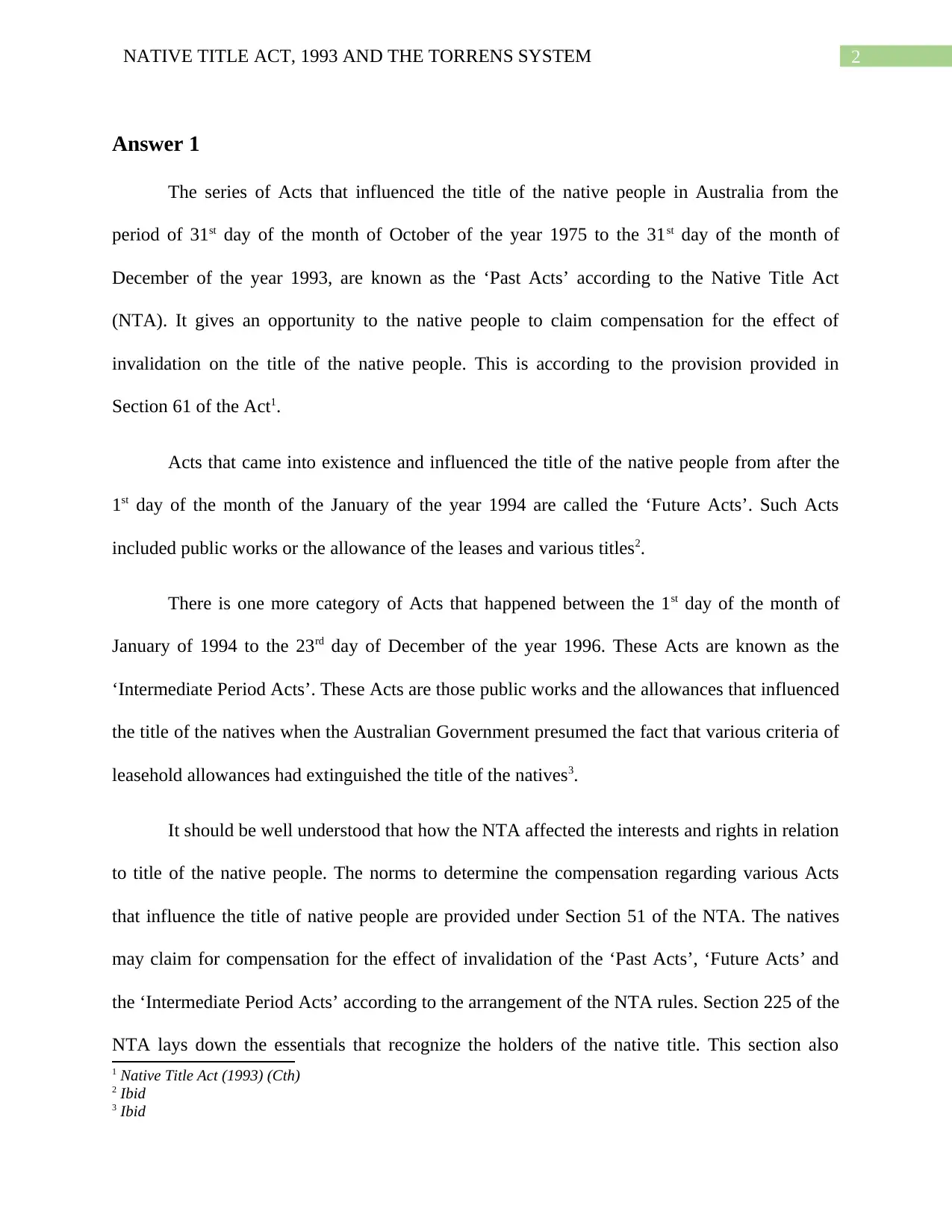
2NATIVE TITLE ACT, 1993 AND THE TORRENS SYSTEM
Answer 1
The series of Acts that influenced the title of the native people in Australia from the
period of 31st day of the month of October of the year 1975 to the 31st day of the month of
December of the year 1993, are known as the ‘Past Acts’ according to the Native Title Act
(NTA). It gives an opportunity to the native people to claim compensation for the effect of
invalidation on the title of the native people. This is according to the provision provided in
Section 61 of the Act1.
Acts that came into existence and influenced the title of the native people from after the
1st day of the month of the January of the year 1994 are called the ‘Future Acts’. Such Acts
included public works or the allowance of the leases and various titles2.
There is one more category of Acts that happened between the 1st day of the month of
January of 1994 to the 23rd day of December of the year 1996. These Acts are known as the
‘Intermediate Period Acts’. These Acts are those public works and the allowances that influenced
the title of the natives when the Australian Government presumed the fact that various criteria of
leasehold allowances had extinguished the title of the natives3.
It should be well understood that how the NTA affected the interests and rights in relation
to title of the native people. The norms to determine the compensation regarding various Acts
that influence the title of native people are provided under Section 51 of the NTA. The natives
may claim for compensation for the effect of invalidation of the ‘Past Acts’, ‘Future Acts’ and
the ‘Intermediate Period Acts’ according to the arrangement of the NTA rules. Section 225 of the
NTA lays down the essentials that recognize the holders of the native title. This section also
1 Native Title Act (1993) (Cth)
2 Ibid
3 Ibid
Answer 1
The series of Acts that influenced the title of the native people in Australia from the
period of 31st day of the month of October of the year 1975 to the 31st day of the month of
December of the year 1993, are known as the ‘Past Acts’ according to the Native Title Act
(NTA). It gives an opportunity to the native people to claim compensation for the effect of
invalidation on the title of the native people. This is according to the provision provided in
Section 61 of the Act1.
Acts that came into existence and influenced the title of the native people from after the
1st day of the month of the January of the year 1994 are called the ‘Future Acts’. Such Acts
included public works or the allowance of the leases and various titles2.
There is one more category of Acts that happened between the 1st day of the month of
January of 1994 to the 23rd day of December of the year 1996. These Acts are known as the
‘Intermediate Period Acts’. These Acts are those public works and the allowances that influenced
the title of the natives when the Australian Government presumed the fact that various criteria of
leasehold allowances had extinguished the title of the natives3.
It should be well understood that how the NTA affected the interests and rights in relation
to title of the native people. The norms to determine the compensation regarding various Acts
that influence the title of native people are provided under Section 51 of the NTA. The natives
may claim for compensation for the effect of invalidation of the ‘Past Acts’, ‘Future Acts’ and
the ‘Intermediate Period Acts’ according to the arrangement of the NTA rules. Section 225 of the
NTA lays down the essentials that recognize the holders of the native title. This section also
1 Native Title Act (1993) (Cth)
2 Ibid
3 Ibid
⊘ This is a preview!⊘
Do you want full access?
Subscribe today to unlock all pages.

Trusted by 1+ million students worldwide
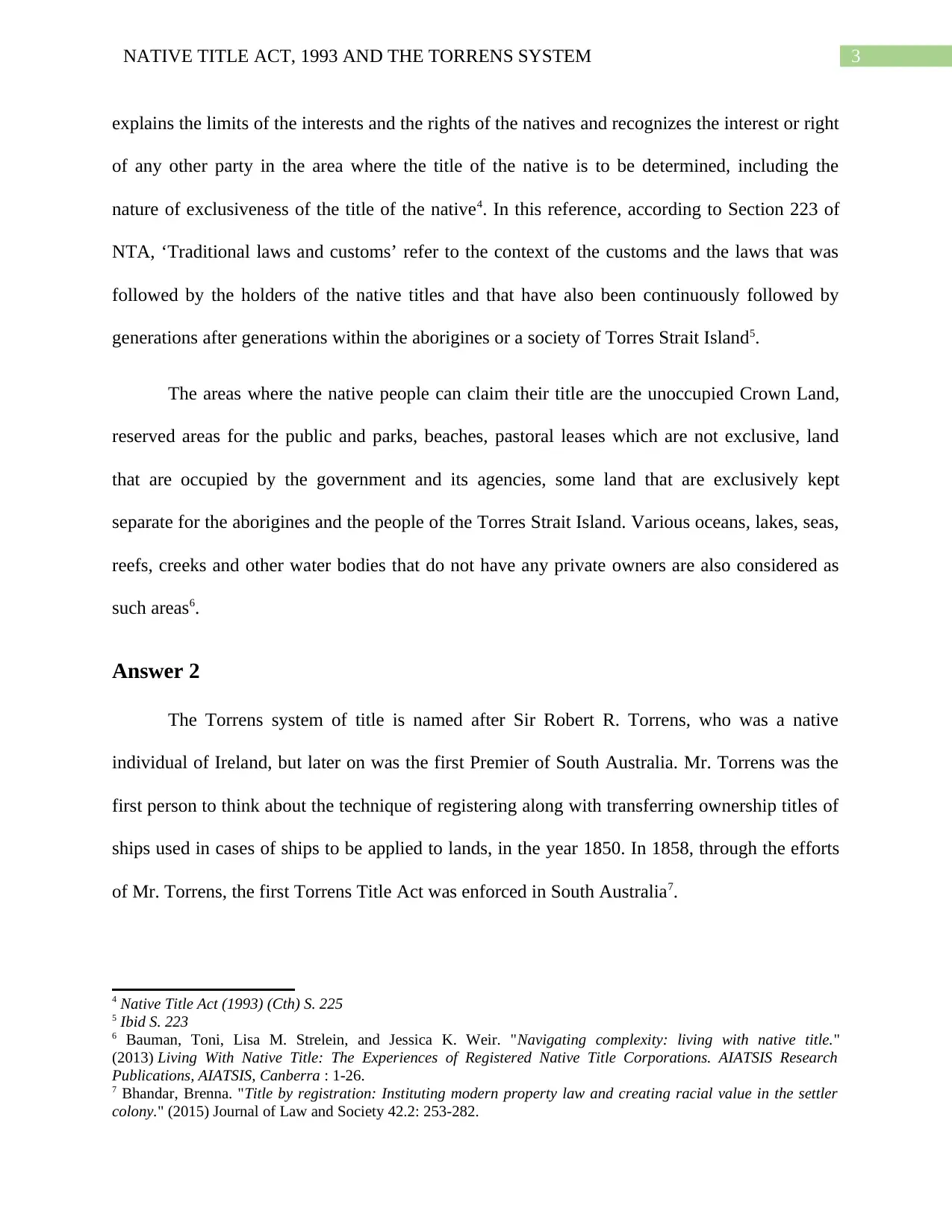
3NATIVE TITLE ACT, 1993 AND THE TORRENS SYSTEM
explains the limits of the interests and the rights of the natives and recognizes the interest or right
of any other party in the area where the title of the native is to be determined, including the
nature of exclusiveness of the title of the native4. In this reference, according to Section 223 of
NTA, ‘Traditional laws and customs’ refer to the context of the customs and the laws that was
followed by the holders of the native titles and that have also been continuously followed by
generations after generations within the aborigines or a society of Torres Strait Island5.
The areas where the native people can claim their title are the unoccupied Crown Land,
reserved areas for the public and parks, beaches, pastoral leases which are not exclusive, land
that are occupied by the government and its agencies, some land that are exclusively kept
separate for the aborigines and the people of the Torres Strait Island. Various oceans, lakes, seas,
reefs, creeks and other water bodies that do not have any private owners are also considered as
such areas6.
Answer 2
The Torrens system of title is named after Sir Robert R. Torrens, who was a native
individual of Ireland, but later on was the first Premier of South Australia. Mr. Torrens was the
first person to think about the technique of registering along with transferring ownership titles of
ships used in cases of ships to be applied to lands, in the year 1850. In 1858, through the efforts
of Mr. Torrens, the first Torrens Title Act was enforced in South Australia7.
4 Native Title Act (1993) (Cth) S. 225
5 Ibid S. 223
6 Bauman, Toni, Lisa M. Strelein, and Jessica K. Weir. "Navigating complexity: living with native title."
(2013) Living With Native Title: The Experiences of Registered Native Title Corporations. AIATSIS Research
Publications, AIATSIS, Canberra : 1-26.
7 Bhandar, Brenna. "Title by registration: Instituting modern property law and creating racial value in the settler
colony." (2015) Journal of Law and Society 42.2: 253-282.
explains the limits of the interests and the rights of the natives and recognizes the interest or right
of any other party in the area where the title of the native is to be determined, including the
nature of exclusiveness of the title of the native4. In this reference, according to Section 223 of
NTA, ‘Traditional laws and customs’ refer to the context of the customs and the laws that was
followed by the holders of the native titles and that have also been continuously followed by
generations after generations within the aborigines or a society of Torres Strait Island5.
The areas where the native people can claim their title are the unoccupied Crown Land,
reserved areas for the public and parks, beaches, pastoral leases which are not exclusive, land
that are occupied by the government and its agencies, some land that are exclusively kept
separate for the aborigines and the people of the Torres Strait Island. Various oceans, lakes, seas,
reefs, creeks and other water bodies that do not have any private owners are also considered as
such areas6.
Answer 2
The Torrens system of title is named after Sir Robert R. Torrens, who was a native
individual of Ireland, but later on was the first Premier of South Australia. Mr. Torrens was the
first person to think about the technique of registering along with transferring ownership titles of
ships used in cases of ships to be applied to lands, in the year 1850. In 1858, through the efforts
of Mr. Torrens, the first Torrens Title Act was enforced in South Australia7.
4 Native Title Act (1993) (Cth) S. 225
5 Ibid S. 223
6 Bauman, Toni, Lisa M. Strelein, and Jessica K. Weir. "Navigating complexity: living with native title."
(2013) Living With Native Title: The Experiences of Registered Native Title Corporations. AIATSIS Research
Publications, AIATSIS, Canberra : 1-26.
7 Bhandar, Brenna. "Title by registration: Instituting modern property law and creating racial value in the settler
colony." (2015) Journal of Law and Society 42.2: 253-282.
Paraphrase This Document
Need a fresh take? Get an instant paraphrase of this document with our AI Paraphraser
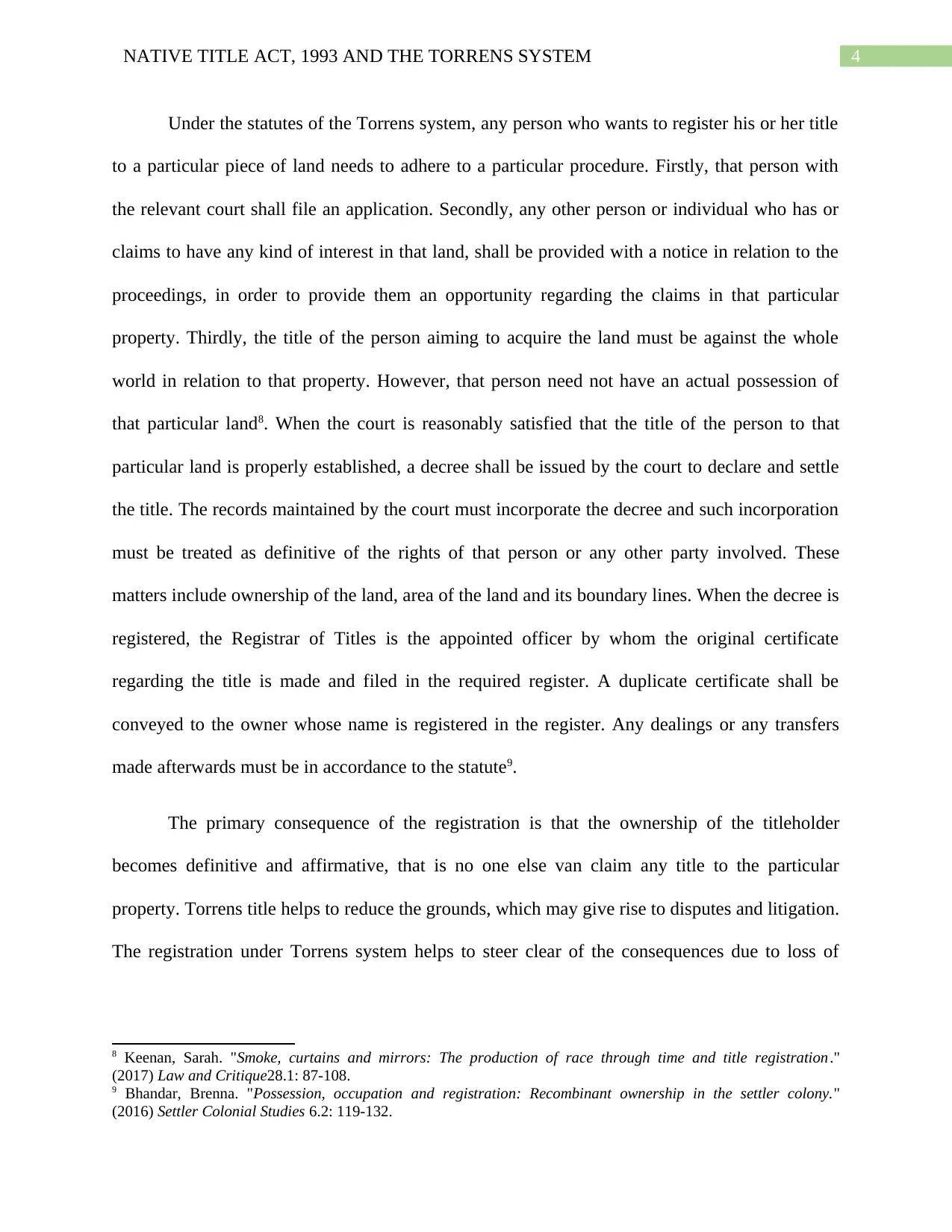
4NATIVE TITLE ACT, 1993 AND THE TORRENS SYSTEM
Under the statutes of the Torrens system, any person who wants to register his or her title
to a particular piece of land needs to adhere to a particular procedure. Firstly, that person with
the relevant court shall file an application. Secondly, any other person or individual who has or
claims to have any kind of interest in that land, shall be provided with a notice in relation to the
proceedings, in order to provide them an opportunity regarding the claims in that particular
property. Thirdly, the title of the person aiming to acquire the land must be against the whole
world in relation to that property. However, that person need not have an actual possession of
that particular land8. When the court is reasonably satisfied that the title of the person to that
particular land is properly established, a decree shall be issued by the court to declare and settle
the title. The records maintained by the court must incorporate the decree and such incorporation
must be treated as definitive of the rights of that person or any other party involved. These
matters include ownership of the land, area of the land and its boundary lines. When the decree is
registered, the Registrar of Titles is the appointed officer by whom the original certificate
regarding the title is made and filed in the required register. A duplicate certificate shall be
conveyed to the owner whose name is registered in the register. Any dealings or any transfers
made afterwards must be in accordance to the statute9.
The primary consequence of the registration is that the ownership of the titleholder
becomes definitive and affirmative, that is no one else van claim any title to the particular
property. Torrens title helps to reduce the grounds, which may give rise to disputes and litigation.
The registration under Torrens system helps to steer clear of the consequences due to loss of
8 Keenan, Sarah. "Smoke, curtains and mirrors: The production of race through time and title registration."
(2017) Law and Critique28.1: 87-108.
9 Bhandar, Brenna. "Possession, occupation and registration: Recombinant ownership in the settler colony."
(2016) Settler Colonial Studies 6.2: 119-132.
Under the statutes of the Torrens system, any person who wants to register his or her title
to a particular piece of land needs to adhere to a particular procedure. Firstly, that person with
the relevant court shall file an application. Secondly, any other person or individual who has or
claims to have any kind of interest in that land, shall be provided with a notice in relation to the
proceedings, in order to provide them an opportunity regarding the claims in that particular
property. Thirdly, the title of the person aiming to acquire the land must be against the whole
world in relation to that property. However, that person need not have an actual possession of
that particular land8. When the court is reasonably satisfied that the title of the person to that
particular land is properly established, a decree shall be issued by the court to declare and settle
the title. The records maintained by the court must incorporate the decree and such incorporation
must be treated as definitive of the rights of that person or any other party involved. These
matters include ownership of the land, area of the land and its boundary lines. When the decree is
registered, the Registrar of Titles is the appointed officer by whom the original certificate
regarding the title is made and filed in the required register. A duplicate certificate shall be
conveyed to the owner whose name is registered in the register. Any dealings or any transfers
made afterwards must be in accordance to the statute9.
The primary consequence of the registration is that the ownership of the titleholder
becomes definitive and affirmative, that is no one else van claim any title to the particular
property. Torrens title helps to reduce the grounds, which may give rise to disputes and litigation.
The registration under Torrens system helps to steer clear of the consequences due to loss of
8 Keenan, Sarah. "Smoke, curtains and mirrors: The production of race through time and title registration."
(2017) Law and Critique28.1: 87-108.
9 Bhandar, Brenna. "Possession, occupation and registration: Recombinant ownership in the settler colony."
(2016) Settler Colonial Studies 6.2: 119-132.
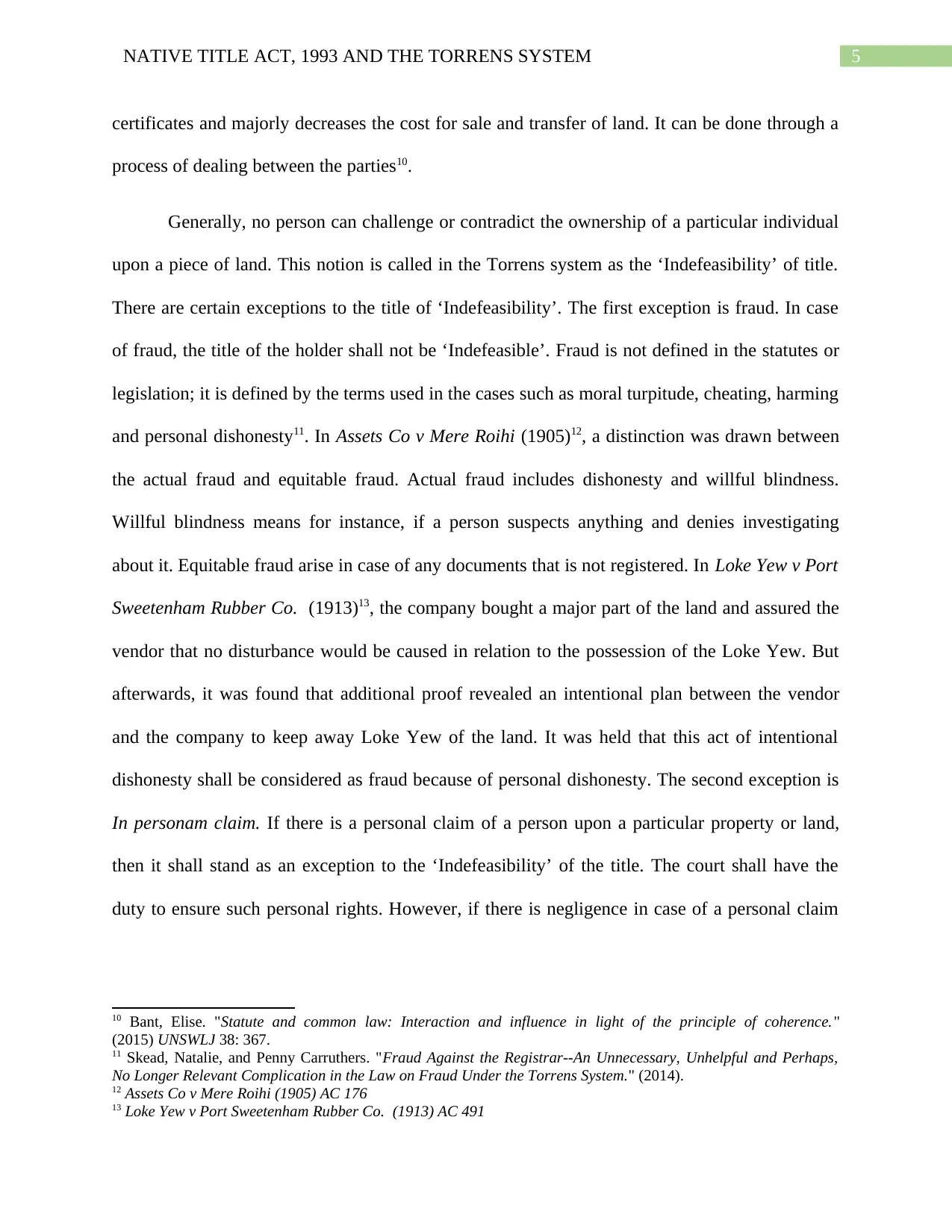
5NATIVE TITLE ACT, 1993 AND THE TORRENS SYSTEM
certificates and majorly decreases the cost for sale and transfer of land. It can be done through a
process of dealing between the parties10.
Generally, no person can challenge or contradict the ownership of a particular individual
upon a piece of land. This notion is called in the Torrens system as the ‘Indefeasibility’ of title.
There are certain exceptions to the title of ‘Indefeasibility’. The first exception is fraud. In case
of fraud, the title of the holder shall not be ‘Indefeasible’. Fraud is not defined in the statutes or
legislation; it is defined by the terms used in the cases such as moral turpitude, cheating, harming
and personal dishonesty11. In Assets Co v Mere Roihi (1905)12, a distinction was drawn between
the actual fraud and equitable fraud. Actual fraud includes dishonesty and willful blindness.
Willful blindness means for instance, if a person suspects anything and denies investigating
about it. Equitable fraud arise in case of any documents that is not registered. In Loke Yew v Port
Sweetenham Rubber Co. (1913)13, the company bought a major part of the land and assured the
vendor that no disturbance would be caused in relation to the possession of the Loke Yew. But
afterwards, it was found that additional proof revealed an intentional plan between the vendor
and the company to keep away Loke Yew of the land. It was held that this act of intentional
dishonesty shall be considered as fraud because of personal dishonesty. The second exception is
In personam claim. If there is a personal claim of a person upon a particular property or land,
then it shall stand as an exception to the ‘Indefeasibility’ of the title. The court shall have the
duty to ensure such personal rights. However, if there is negligence in case of a personal claim
10 Bant, Elise. "Statute and common law: Interaction and influence in light of the principle of coherence."
(2015) UNSWLJ 38: 367.
11 Skead, Natalie, and Penny Carruthers. "Fraud Against the Registrar--An Unnecessary, Unhelpful and Perhaps,
No Longer Relevant Complication in the Law on Fraud Under the Torrens System." (2014).
12 Assets Co v Mere Roihi (1905) AC 176
13 Loke Yew v Port Sweetenham Rubber Co. (1913) AC 491
certificates and majorly decreases the cost for sale and transfer of land. It can be done through a
process of dealing between the parties10.
Generally, no person can challenge or contradict the ownership of a particular individual
upon a piece of land. This notion is called in the Torrens system as the ‘Indefeasibility’ of title.
There are certain exceptions to the title of ‘Indefeasibility’. The first exception is fraud. In case
of fraud, the title of the holder shall not be ‘Indefeasible’. Fraud is not defined in the statutes or
legislation; it is defined by the terms used in the cases such as moral turpitude, cheating, harming
and personal dishonesty11. In Assets Co v Mere Roihi (1905)12, a distinction was drawn between
the actual fraud and equitable fraud. Actual fraud includes dishonesty and willful blindness.
Willful blindness means for instance, if a person suspects anything and denies investigating
about it. Equitable fraud arise in case of any documents that is not registered. In Loke Yew v Port
Sweetenham Rubber Co. (1913)13, the company bought a major part of the land and assured the
vendor that no disturbance would be caused in relation to the possession of the Loke Yew. But
afterwards, it was found that additional proof revealed an intentional plan between the vendor
and the company to keep away Loke Yew of the land. It was held that this act of intentional
dishonesty shall be considered as fraud because of personal dishonesty. The second exception is
In personam claim. If there is a personal claim of a person upon a particular property or land,
then it shall stand as an exception to the ‘Indefeasibility’ of the title. The court shall have the
duty to ensure such personal rights. However, if there is negligence in case of a personal claim
10 Bant, Elise. "Statute and common law: Interaction and influence in light of the principle of coherence."
(2015) UNSWLJ 38: 367.
11 Skead, Natalie, and Penny Carruthers. "Fraud Against the Registrar--An Unnecessary, Unhelpful and Perhaps,
No Longer Relevant Complication in the Law on Fraud Under the Torrens System." (2014).
12 Assets Co v Mere Roihi (1905) AC 176
13 Loke Yew v Port Sweetenham Rubber Co. (1913) AC 491
⊘ This is a preview!⊘
Do you want full access?
Subscribe today to unlock all pages.

Trusted by 1+ million students worldwide
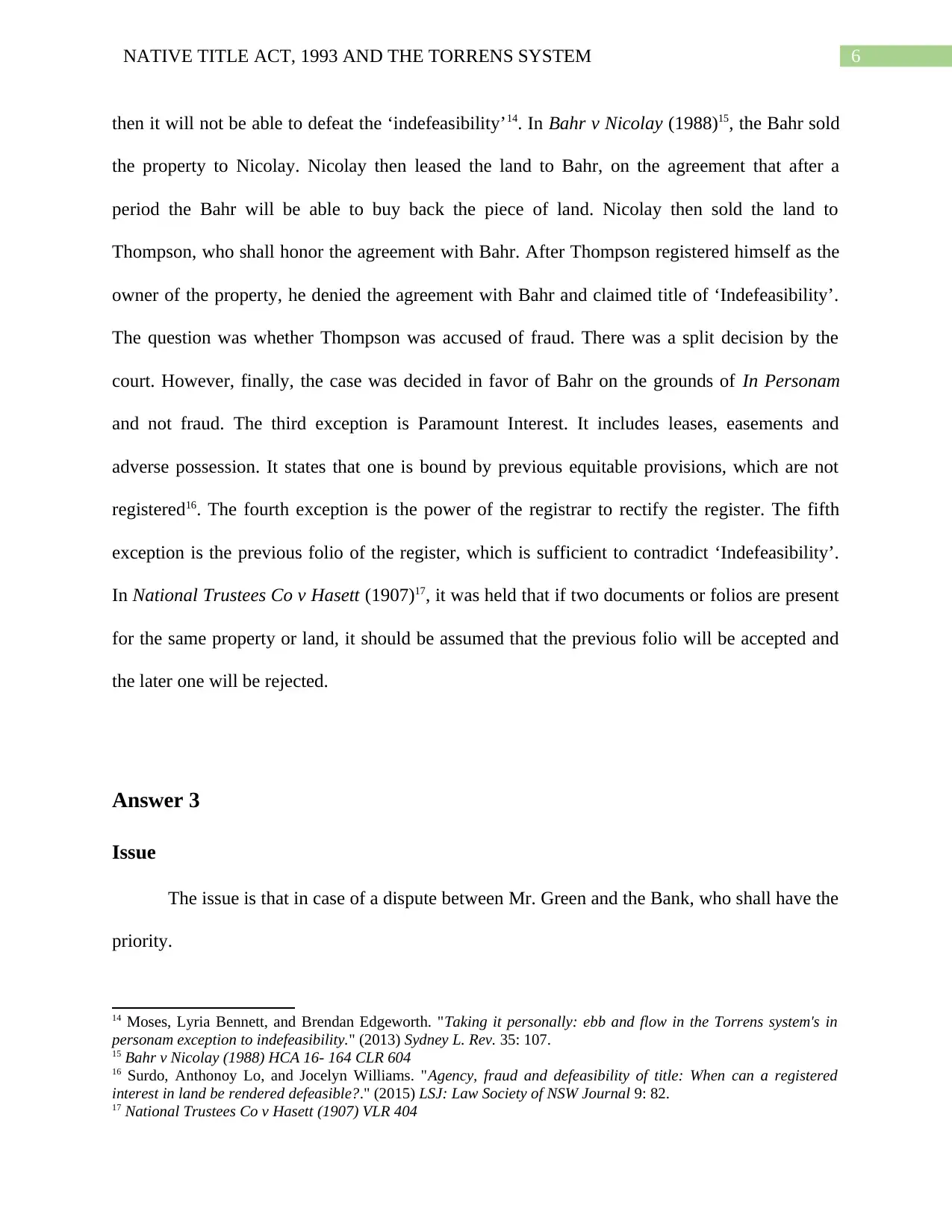
6NATIVE TITLE ACT, 1993 AND THE TORRENS SYSTEM
then it will not be able to defeat the ‘indefeasibility’14. In Bahr v Nicolay (1988)15, the Bahr sold
the property to Nicolay. Nicolay then leased the land to Bahr, on the agreement that after a
period the Bahr will be able to buy back the piece of land. Nicolay then sold the land to
Thompson, who shall honor the agreement with Bahr. After Thompson registered himself as the
owner of the property, he denied the agreement with Bahr and claimed title of ‘Indefeasibility’.
The question was whether Thompson was accused of fraud. There was a split decision by the
court. However, finally, the case was decided in favor of Bahr on the grounds of In Personam
and not fraud. The third exception is Paramount Interest. It includes leases, easements and
adverse possession. It states that one is bound by previous equitable provisions, which are not
registered16. The fourth exception is the power of the registrar to rectify the register. The fifth
exception is the previous folio of the register, which is sufficient to contradict ‘Indefeasibility’.
In National Trustees Co v Hasett (1907)17, it was held that if two documents or folios are present
for the same property or land, it should be assumed that the previous folio will be accepted and
the later one will be rejected.
Answer 3
Issue
The issue is that in case of a dispute between Mr. Green and the Bank, who shall have the
priority.
14 Moses, Lyria Bennett, and Brendan Edgeworth. "Taking it personally: ebb and flow in the Torrens system's in
personam exception to indefeasibility." (2013) Sydney L. Rev. 35: 107.
15 Bahr v Nicolay (1988) HCA 16- 164 CLR 604
16 Surdo, Anthonoy Lo, and Jocelyn Williams. "Agency, fraud and defeasibility of title: When can a registered
interest in land be rendered defeasible?." (2015) LSJ: Law Society of NSW Journal 9: 82.
17 National Trustees Co v Hasett (1907) VLR 404
then it will not be able to defeat the ‘indefeasibility’14. In Bahr v Nicolay (1988)15, the Bahr sold
the property to Nicolay. Nicolay then leased the land to Bahr, on the agreement that after a
period the Bahr will be able to buy back the piece of land. Nicolay then sold the land to
Thompson, who shall honor the agreement with Bahr. After Thompson registered himself as the
owner of the property, he denied the agreement with Bahr and claimed title of ‘Indefeasibility’.
The question was whether Thompson was accused of fraud. There was a split decision by the
court. However, finally, the case was decided in favor of Bahr on the grounds of In Personam
and not fraud. The third exception is Paramount Interest. It includes leases, easements and
adverse possession. It states that one is bound by previous equitable provisions, which are not
registered16. The fourth exception is the power of the registrar to rectify the register. The fifth
exception is the previous folio of the register, which is sufficient to contradict ‘Indefeasibility’.
In National Trustees Co v Hasett (1907)17, it was held that if two documents or folios are present
for the same property or land, it should be assumed that the previous folio will be accepted and
the later one will be rejected.
Answer 3
Issue
The issue is that in case of a dispute between Mr. Green and the Bank, who shall have the
priority.
14 Moses, Lyria Bennett, and Brendan Edgeworth. "Taking it personally: ebb and flow in the Torrens system's in
personam exception to indefeasibility." (2013) Sydney L. Rev. 35: 107.
15 Bahr v Nicolay (1988) HCA 16- 164 CLR 604
16 Surdo, Anthonoy Lo, and Jocelyn Williams. "Agency, fraud and defeasibility of title: When can a registered
interest in land be rendered defeasible?." (2015) LSJ: Law Society of NSW Journal 9: 82.
17 National Trustees Co v Hasett (1907) VLR 404
Paraphrase This Document
Need a fresh take? Get an instant paraphrase of this document with our AI Paraphraser
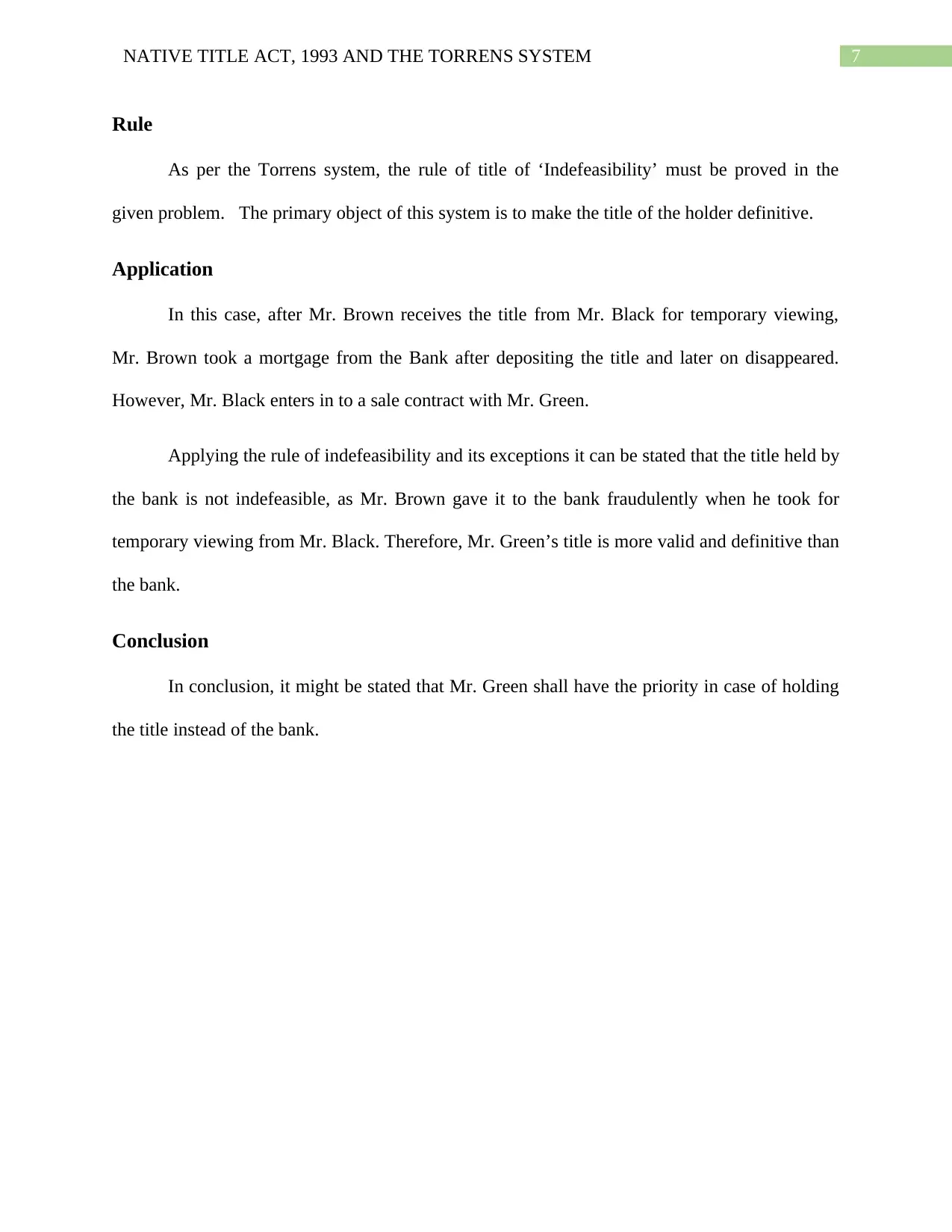
7NATIVE TITLE ACT, 1993 AND THE TORRENS SYSTEM
Rule
As per the Torrens system, the rule of title of ‘Indefeasibility’ must be proved in the
given problem. The primary object of this system is to make the title of the holder definitive.
Application
In this case, after Mr. Brown receives the title from Mr. Black for temporary viewing,
Mr. Brown took a mortgage from the Bank after depositing the title and later on disappeared.
However, Mr. Black enters in to a sale contract with Mr. Green.
Applying the rule of indefeasibility and its exceptions it can be stated that the title held by
the bank is not indefeasible, as Mr. Brown gave it to the bank fraudulently when he took for
temporary viewing from Mr. Black. Therefore, Mr. Green’s title is more valid and definitive than
the bank.
Conclusion
In conclusion, it might be stated that Mr. Green shall have the priority in case of holding
the title instead of the bank.
Rule
As per the Torrens system, the rule of title of ‘Indefeasibility’ must be proved in the
given problem. The primary object of this system is to make the title of the holder definitive.
Application
In this case, after Mr. Brown receives the title from Mr. Black for temporary viewing,
Mr. Brown took a mortgage from the Bank after depositing the title and later on disappeared.
However, Mr. Black enters in to a sale contract with Mr. Green.
Applying the rule of indefeasibility and its exceptions it can be stated that the title held by
the bank is not indefeasible, as Mr. Brown gave it to the bank fraudulently when he took for
temporary viewing from Mr. Black. Therefore, Mr. Green’s title is more valid and definitive than
the bank.
Conclusion
In conclusion, it might be stated that Mr. Green shall have the priority in case of holding
the title instead of the bank.
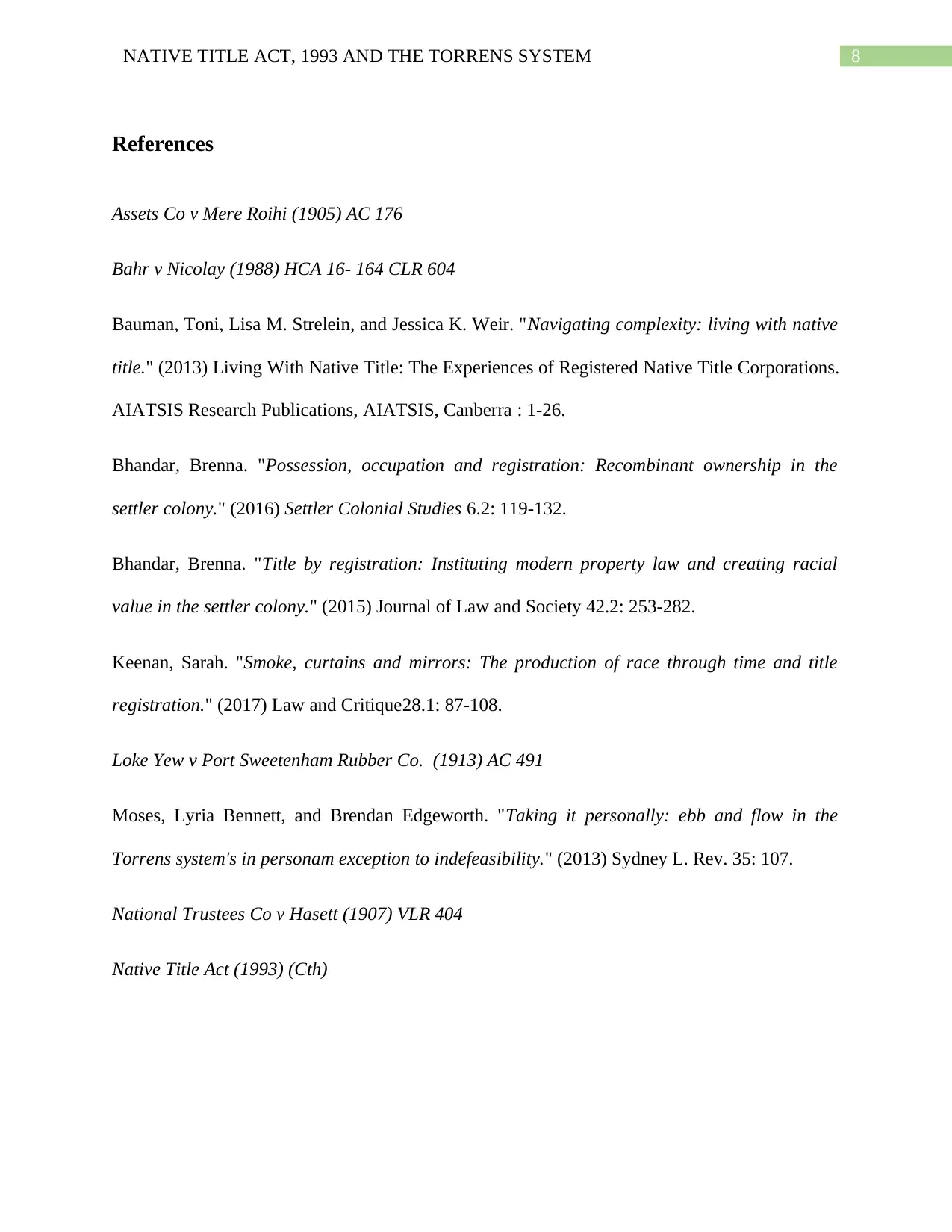
8NATIVE TITLE ACT, 1993 AND THE TORRENS SYSTEM
References
Assets Co v Mere Roihi (1905) AC 176
Bahr v Nicolay (1988) HCA 16- 164 CLR 604
Bauman, Toni, Lisa M. Strelein, and Jessica K. Weir. "Navigating complexity: living with native
title." (2013) Living With Native Title: The Experiences of Registered Native Title Corporations.
AIATSIS Research Publications, AIATSIS, Canberra : 1-26.
Bhandar, Brenna. "Possession, occupation and registration: Recombinant ownership in the
settler colony." (2016) Settler Colonial Studies 6.2: 119-132.
Bhandar, Brenna. "Title by registration: Instituting modern property law and creating racial
value in the settler colony." (2015) Journal of Law and Society 42.2: 253-282.
Keenan, Sarah. "Smoke, curtains and mirrors: The production of race through time and title
registration." (2017) Law and Critique28.1: 87-108.
Loke Yew v Port Sweetenham Rubber Co. (1913) AC 491
Moses, Lyria Bennett, and Brendan Edgeworth. "Taking it personally: ebb and flow in the
Torrens system's in personam exception to indefeasibility." (2013) Sydney L. Rev. 35: 107.
National Trustees Co v Hasett (1907) VLR 404
Native Title Act (1993) (Cth)
References
Assets Co v Mere Roihi (1905) AC 176
Bahr v Nicolay (1988) HCA 16- 164 CLR 604
Bauman, Toni, Lisa M. Strelein, and Jessica K. Weir. "Navigating complexity: living with native
title." (2013) Living With Native Title: The Experiences of Registered Native Title Corporations.
AIATSIS Research Publications, AIATSIS, Canberra : 1-26.
Bhandar, Brenna. "Possession, occupation and registration: Recombinant ownership in the
settler colony." (2016) Settler Colonial Studies 6.2: 119-132.
Bhandar, Brenna. "Title by registration: Instituting modern property law and creating racial
value in the settler colony." (2015) Journal of Law and Society 42.2: 253-282.
Keenan, Sarah. "Smoke, curtains and mirrors: The production of race through time and title
registration." (2017) Law and Critique28.1: 87-108.
Loke Yew v Port Sweetenham Rubber Co. (1913) AC 491
Moses, Lyria Bennett, and Brendan Edgeworth. "Taking it personally: ebb and flow in the
Torrens system's in personam exception to indefeasibility." (2013) Sydney L. Rev. 35: 107.
National Trustees Co v Hasett (1907) VLR 404
Native Title Act (1993) (Cth)
⊘ This is a preview!⊘
Do you want full access?
Subscribe today to unlock all pages.

Trusted by 1+ million students worldwide
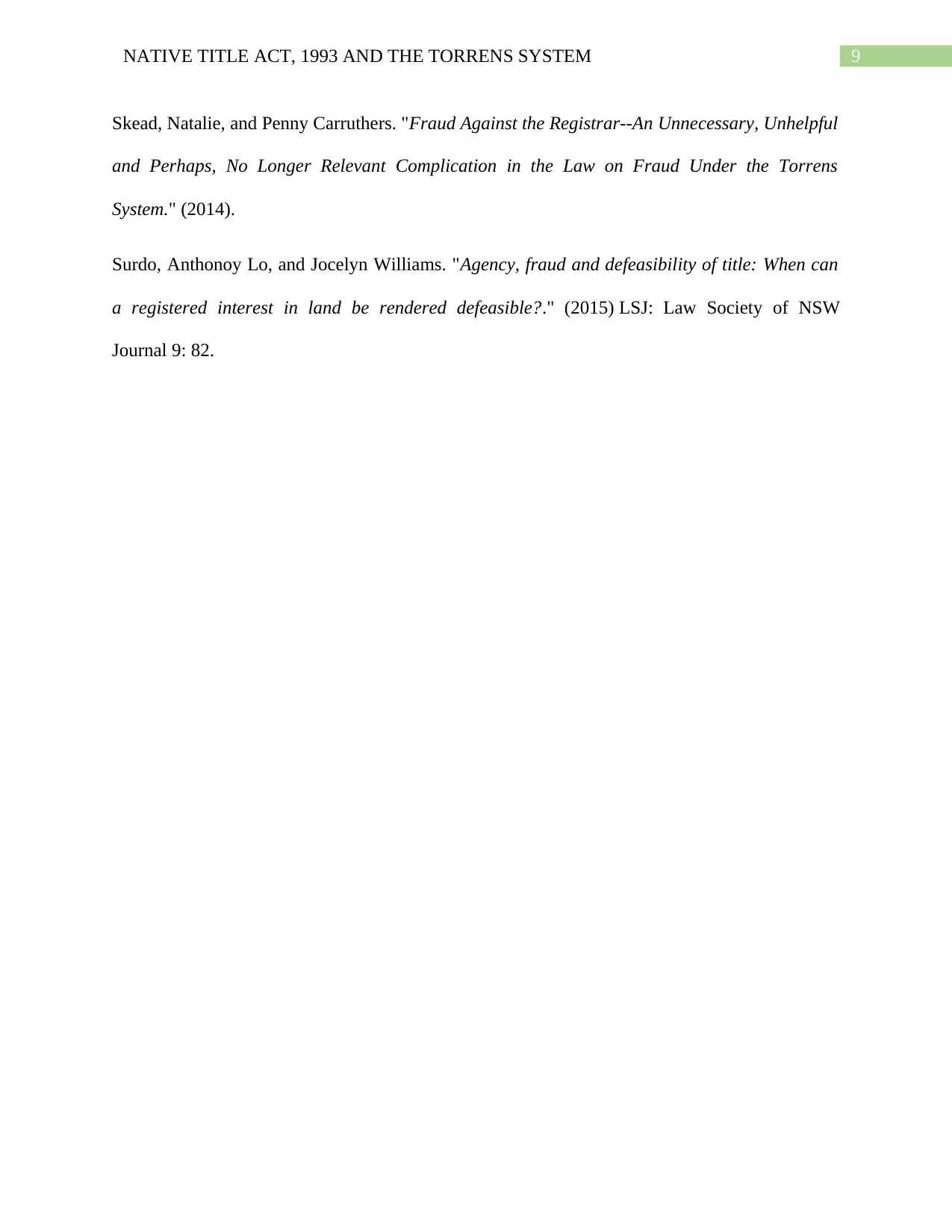
9NATIVE TITLE ACT, 1993 AND THE TORRENS SYSTEM
Skead, Natalie, and Penny Carruthers. "Fraud Against the Registrar--An Unnecessary, Unhelpful
and Perhaps, No Longer Relevant Complication in the Law on Fraud Under the Torrens
System." (2014).
Surdo, Anthonoy Lo, and Jocelyn Williams. "Agency, fraud and defeasibility of title: When can
a registered interest in land be rendered defeasible?." (2015) LSJ: Law Society of NSW
Journal 9: 82.
Skead, Natalie, and Penny Carruthers. "Fraud Against the Registrar--An Unnecessary, Unhelpful
and Perhaps, No Longer Relevant Complication in the Law on Fraud Under the Torrens
System." (2014).
Surdo, Anthonoy Lo, and Jocelyn Williams. "Agency, fraud and defeasibility of title: When can
a registered interest in land be rendered defeasible?." (2015) LSJ: Law Society of NSW
Journal 9: 82.
1 out of 10
Your All-in-One AI-Powered Toolkit for Academic Success.
+13062052269
info@desklib.com
Available 24*7 on WhatsApp / Email
![[object Object]](/_next/static/media/star-bottom.7253800d.svg)
Unlock your academic potential
Copyright © 2020–2026 A2Z Services. All Rights Reserved. Developed and managed by ZUCOL.
